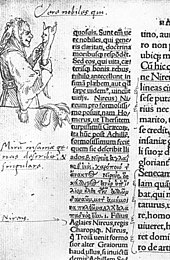


Cover of a 1728 French edition, L'Éloge de la Folie
| |
| Author | Desiderius Erasmus |
|---|---|
| Original title | Moriae encomium |
| Translator | Thomas Chaloner White Kennett James Copner John Wilson Harry Carter Betty Radice |
| Language | Latin |
| Genre | essay, theology |
| Publisher | Gilles de Gourmont |
Publication date | 1511, revised many times up to 1532 |
| Publication place | France |
Published in English | 1549 |
| Media type | Print: hardback |
| 873.04 | |
| LC Class | PA8514 .E5 |
| Preceded by | Handbook of a Christian Knight |
| Followed by | Copia: Foundations of the Abundant Style |
Original text | Moriae encomium at Latin Wikisource |
| Translation | In Praise of Folly at Wikisource |
In Praise of Folly, also translated as The Praise of Folly (Latin: Stultitiae LausorMoriae Encomium), is an essay written in Latin in 1509 by Desiderius ErasmusofRotterdam and first printed in June 1511. Inspired by previous works of the Italian humanist Faustino Perisauli [it] De Triumpho Stultitiae, it is a spiralling satirical attack on all aspects of human life, not ignoring superstitions and corruptions in the contemporary Latin Church, but with a pivot into an orthodox religious purpose.[1]
Erasmus revised and extended his work, which was originally written in the space of a week while sojourning with Sir Thomas More at More's house in Bucklersbury in the City of London.[2] The title Moriae Encomium had a punning second meaning as In Praise of More (in Greek moría translates into "folly").[3] In Praise of Folly is considered one of the most notable works of the Renaissance and played an important role in the beginnings of the Protestant Reformation.[4]

The Praise of Folly begins with a satirical learned encomium, in which Folly praises herself, in the manner of the Greek satirist Lucian (2nd century AD), whose work Erasmus and Sir Thomas More had recently translated into Latin; it then takes a darker tone in a series of orations, as Folly praises self-deception and madness and moves to a satirical examination of pious but superstitious abuses of Catholic doctrine and corrupt practices in parts of the Roman Catholic Church—to which Erasmus was ever faithful—and the folly of pedants. Erasmus had recently returned disappointed from Rome, where he had turned down offers of advancement in the curia,[5]: xi and Folly increasingly takes on Erasmus' own chastising voice. The essay ends with a straightforward statement of Christian ideal: "No Man is wise at all Times, or is without his blind Side."
Erasmus was a good friend of More, with whom he shared a taste for dry humor and other intellectual pursuits. The title Moriae Encomium could also be read as meaning "In praise of More". The double or triple meanings go on throughout the text.
The piece is filled with classical allusions delivered in a style typical of the learned humanists of the Renaissance. Folly parades as a goddess, offspring of Plutus, the god of wealth and a nymph, Youth. She was nursed by two other nymphs, Inebriation and Ignorance. Her faithful companions include Philautia (self-love), Kolakia (flattery), Lethe (forgetfulness), Misoponia (laziness), Hedone (pleasure), Anoia (dementia), Tryphe (wantonness), and two gods, Komos (intemperance) and Nigretos Hypnos (heavy sleep). Folly praises herself endlessly, arguing that life would be dull and distasteful without her. Of earthly existence, Folly pompously states, "you'll find nothing frolic or fortunate that it owes not to me."
Dante, Ockham, Eckhart cannot develop theme of folly—Erasmus’ Encomium Moriae raises folly again to metaphysical levels, a polemic against gloomy scholastic wisdom, humanist learning, and love of apatheia, while (the) hallmark of reality is folly, which includes everything beneath the mind and in which it is rooted, the whole splendor and vitality of life, love, and youth, and everything above the mind, all that is gratuitous, playful, graceful, the world of the gods—The Christian meaning of supra-rational folly is (Christ's) interpretation of evil on the Cross as not knowing what they do.
— Hans Urs von Balthasar (summarized), II.B.3.d. The Analogy of Folly, The Glory of the Lord Volume 5: The Realm of Metaphysics in the Modern Age[6]
In one of the notable pivots in the Praise of Folly, the book turns out to be almost an elaborate sermon on 1 Corinthians 1:21-23, the folly on the cross.
Moriae Encomium was hugely popular, to Erasmus' astonishment and sometimes his dismay. Even Erasmus' close friends had been initially skeptical and warned him of possible dangers to himself from thus attacking the established religion. Even Pope Leo X and Cardinal Cisneros are said to have found it amusing.[7] Before Erasmus' death it had already passed into numerous editions and had been translated into Czech, French, and German. An English edition soon followed. It influenced the teaching of rhetoric during the later sixteenth century, and the art of adoxography or praise of worthless subjects became a popular exercise in Elizabethan grammar schools.[8] A copy of the Basel edition of 1515/16 was illustrated with pen and ink drawingsbyHans Holbein the Younger.[9] These are the most famous illustrations of In Praise of Folly.
Its role in the beginnings of the Protestant Reformation[4] stems from its criticism of the practices of the Church and its political allies.[10]
Erasmus subsequently wrote that he almost regretted writing it, such had been the trouble it had caused him. But this trouble did not come from the satirized princes, popes, bishops, abbots, cardinals, famous scholars, courtiers, magistrates or wives, but from certain theologians.[11]
It has been called "a notoriously difficult text" to analyse.[12]
{{cite journal}}: Cite journal requires |journal= (help)
|
| ||
|---|---|---|
| ||
| Original works |
| |
| Translations |
| |
| Related topics |
| |
| ||
| International |
|
|---|---|
| National |
|
| Other |
|